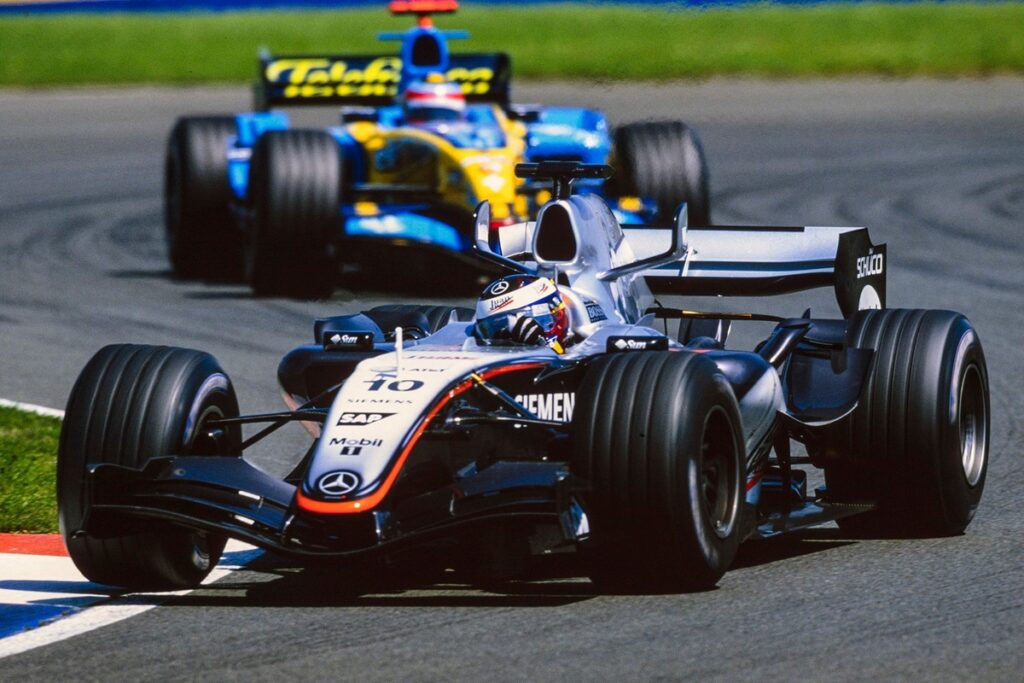FIA president Mohammed Ben Sulayem thinks Formula 1 should at least consider switching back to V10 engines in the future, running on sustainable fuel.
F1 is switching to fully synthetic fuel from next year as part of its change in engine formula, which will feature a near-50/50 split between output from a V6 internal combustion engine and a more powerful MGU-K electric motor, increasing the reliance on electric energy compared to current powertrains.
That move aimed at drawing more manufacturers into the series, with Audi joining from 2026 and Cadillac also planning to develop in-house power units from 2028 for its nascent outfit that joins as an 11th expansion team next year. After F1’s latest hybrid rules were finalised, Honda also made a U-turn on its earlier decision to leave the series, although F1 is set to lose Renault as a works manufacturer.
But with F1 now committed to using less polluting synthetic fuels as part of its goals to achieve a net-zero carbon footprint by 2030, some would like to see F1 return to screaming V10 engines, which were last used by the entire grid in 2005.
FIA president Ben Sulayem has now also suggested going back to a V10 on sustainable fuels is something that should at least be looked at when the governing body and its stakeholders define F1’s future engine formula beyond the one that will be introduced next year.
“This week’s F1 launch in London has triggered a lot of positive discussion on the future of the sport,” the governing body’s president wrote on social media. “While we look forward to the introduction of the 2026 regulations on chassis and power unit, we must also lead the way on future technological motorsport trends.
“We should consider a range of directions including the roaring sound of the V10 running on sustainable fuel. Whichever direction is chosen, we must support the teams and manufacturers in ensuring cost control on R&D expenditure.”
FIA president Mohammed Ben Sulayem
Photo by: Dom Romney / Motorsport Images
It echoes comments from F1 CEO Stefano Domenicali, where he suggested he would also like to explore which alternatives to the current hybrid power units are viable within the industry.
“If sustainable fuel is doing the right job to be zero emission and we are taking the point of sustainability in the right way – maybe we don’t need anymore to be so complicated or so expensive in terms of engine development,” Domenicali told Autosport last August.
“So we may think to go back to engines that are much lighter and maybe with a good sound.”
Returning to V10s would be a popular move among old-school fans who miss the screaming soundtrack of a bygone era, but what will really matter is whether F1’s existing and prospective manufacturers are onboard, which appears highly unlikely at this stage. It was ultimately a bigger reliance on the electric component that made it through for 2026.
While there has been a big push behind e-fuels, they remain expensive and inefficient compared to electric and hybrid models, and OEMs involved in F1 have yet to express any desire to move away from a hybrid formula.
Paddy Lowe, the founder of Zero Petroleum – a carbon-neutral synthetic fuel company – also felt dropping hybrids would be a non-starter in the near future.
“I’ve seen that idea for a very long time, actually, and there’s an element of that [vision] in the formation of our company Zero,” the former Mercedes and Williams engineer said about a return to V10s on a recent episode of the James Allen on F1 podcast.
“[But] Formula 1 is a hybrid formula today, that is actually a very good solution for mainstream automotive, I think.”
In this article
Be the first to know and subscribe for real-time news email updates on these topics
Subscribe to news alerts
Read the full article here

